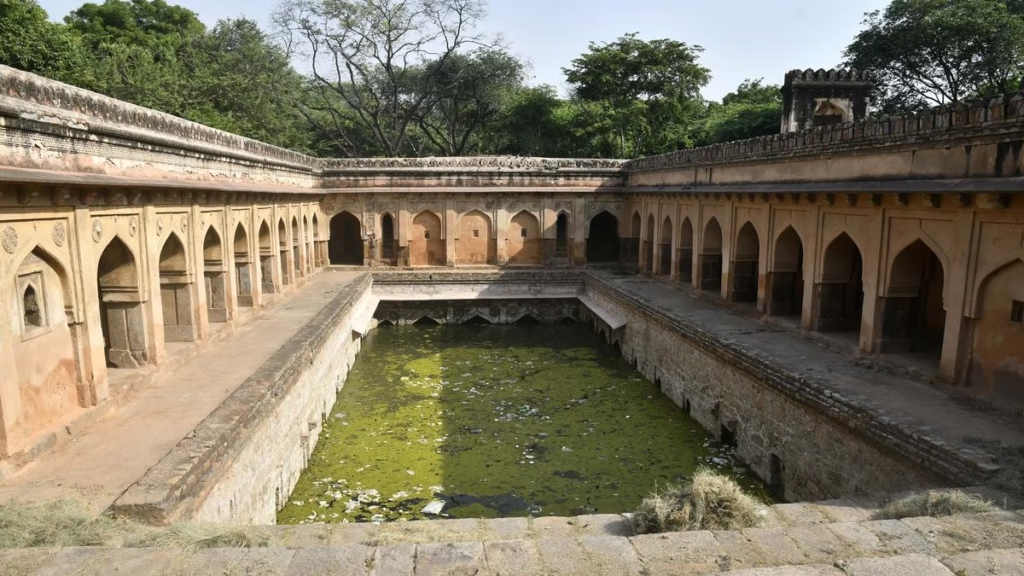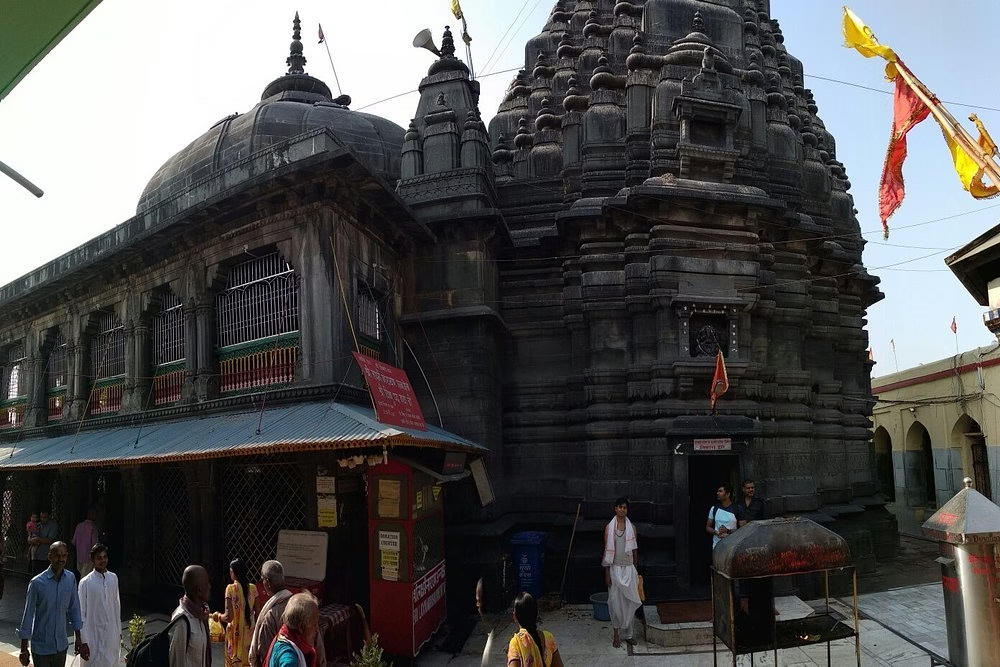THE HINDU 17.05.2025
General Studies Paper 1 (GS 1)
Syllabus Coverage: Indian Heritage and Culture, History, Geography, Society
1. Topic: Indian Heritage and Culture – Conservation of Historical Monuments
- Newspaper Reference: Page 5 – “ASI completes conservation work in Lodhi-era stepwell”
- Details: The Archaeological Survey of India (ASI), in collaboration with the World Monuments Fund, has completed conservation work on a stepwell from the Lodhi era. This highlights efforts to preserve India’s architectural heritage.
- UPSC Relevance:
- Syllabus Link: Indian culture – salient aspects of art forms, architecture, and heritage conservation.
- Explanation: Stepwells are significant examples of medieval Indian architecture, reflecting water management systems and aesthetic designs. The Lodhi era (15th-16th century) is part of the Delhi Sultanate, and its architectural contributions (e.g., tombs, mosques, stepwells) are crucial for GS 1. Conservation efforts by ASI underscore the government’s role in heritage preservation, a recurring theme in UPSC questions.
- Key Points for Notes:
- Historical Context: Stepwells (baolis) were built for water storage and social gatherings, showcasing engineering and artistic skills. Lodhi-era stepwells are notable for their geometric patterns and functional design.
- ASI’s Role: ASI is responsible for protecting and maintaining centrally protected monuments under the Ancient Monuments and Archaeological Sites and Remains Act, 1958.
- Collaboration: Partnership with the World Monuments Fund indicates international cooperation in heritage conservation, aligning with global frameworks like UNESCO’s World Heritage Sites.
- Significance: Conservation efforts preserve cultural identity, promote tourism, and ensure sustainable use of historical sites.
- UPSC Application: Questions may focus on the role of ASI, challenges in heritage conservation (e.g., urbanization, funding), or the cultural significance of stepwells. Link this to broader themes like sustainable development and cultural tourism.

2. Topic: Society – Urbanization and Cultural Identity
- Newspaper Reference: Page 2 – “Bihar govt. approves plan to rename Gaya city as ‘Gaya Jee’”
- Details: The Bihar government’s decision to rename Gaya reflects efforts to emphasize cultural and religious significance, as Gaya is a major pilgrimage site for Hindus and Buddhists.
- UPSC Relevance:
- Syllabus Link: Indian society – diversity, urbanization, and cultural identity.
- Explanation: Renaming cities is a socio-cultural phenomenon tied to identity politics, regional pride, and historical legacy. Gaya, associated with the Mahabodhi Temple (a UNESCO World Heritage Site) and Hindu rituals like pind daan, represents India’s religious diversity. This topic connects to urbanization, as renaming often accompanies urban development and tourism promotion.
- Key Points for Notes:
- Cultural Significance: Gaya is a sacred site for Hindus (Vishnupad Temple) and Buddhists (Bodhgaya). Renaming to ‘Gaya Jee’ may emphasize reverence, aligning with local sentiments.
- Urbanization Link: Renaming reflects efforts to brand cities for tourism and economic growth, a trend seen in cases like Allahabad to Prayagraj or Gurgaon to Gurugram.
- Social Impact: Such decisions can foster regional pride but may also spark debates over historical names and inclusivity.
- Challenges: Balancing modernization with cultural preservation, addressing public sentiment, and ensuring administrative efficiency during transitions.
- UPSC Application: Questions may explore the socio-cultural implications of renaming cities, its impact on federalism, or its role in tourism-driven urban development. Link to GS 1 themes like social change and cultural heritage.

General Studies Paper 2 (GS 2)
Syllabus Coverage: Governance, Constitution, Polity, Social Justice, International Relations
1. Topic: International Relations – India-Pakistan Relations
- Newspaper Reference: Pages 1, 4 – “Pak. will use IMF money to fund terror: Rajnath”
- Details: The article mentions concerns about Pakistan’s use of IMF funds, raising issues of terrorism financing and its implications for India’s security.
- UPSC Relevance:
- Syllabus Link: India and its neighborhood – relations, effect of policies of developed and developing countries on India’s interests.
- Explanation: India-Pakistan relations are a critical topic in GS 2, given the history of conflicts, terrorism, and diplomatic tensions. Allegations of Pakistan misusing international aid (e.g., IMF funds) for terrorism highlight India’s concerns about cross-border terrorism, a key issue in bilateral relations and global forums like the UN or FATF (Financial Action Task Force).
- Key Points for Notes:
- Context: India has consistently raised concerns about Pakistan’s state-sponsored terrorism, particularly post-Uri (2016) and Pulwama (2019) attacks.
- IMF Funds: The International Monetary Fund provides financial assistance to stabilize economies. Misuse of such funds for terrorism violates international norms and affects India’s security.
- India’s Stance: India advocates for global action against terrorism financing, pushing for Pakistan’s accountability in forums like FATF, where Pakistan has been on the grey list.
- Implications: Strengthens India’s case for reforms in global financial institutions and highlights the need for robust counter-terrorism measures.
- UPSC Application: Questions may focus on India’s diplomatic strategy to counter Pakistan-sponsored terrorism, the role of international organizations (e.g., FATF, UN), or challenges in bilateral relations. Link to GS 2 themes like global governance and security.
2. Topic: International Relations – India’s Response to Global Conflicts
- Newspaper Reference: Page 3 – “The new normal after Pahalgam, India’s response”
- Details: The editorial likely discusses India’s response to a specific event in Pahalgam, possibly related to security or diplomacy, though details are limited.
- UPSC Relevance:
- Syllabus Link: International relations – India’s role in global affairs, bilateral and multilateral engagements.
- Explanation: Pahalgam, in Jammu and Kashmir, is a sensitive region due to its proximity to conflict zones and tourism significance. Any incident here (e.g., security breach, diplomatic event) would require India to balance domestic security with international perceptions, especially given J&K’s global attention post-Article 370 abrogation (2019).
- Key Points for Notes:
- Strategic Importance: Jammu and Kashmir is central to India’s security and foreign policy, with implications for relations with Pakistan and China.
- India’s Response: Likely involves strengthening security, engaging with global partners, and countering negative narratives in international media.
- Global Context: India’s response would be scrutinized by organizations like the UN, reflecting its commitment to sovereignty and counter-terrorism.
- Challenges: Managing domestic stability while addressing international concerns, especially in a post-Article 370 context.
- UPSC Application: Questions may explore India’s handling of J&K-related issues on global platforms, its counter-terrorism strategy, or the impact of regional stability on foreign policy. Link to GS 2 themes like diplomacy and national security.
3. Topic: International Relations – Global Conflicts and India’s Position
- Newspaper Reference: Page 7 – “Russia, Ukraine agree to swap prisoners, fail to reach truce” and “Iran and European powers hold nuclear talks in Turkiye”
- Details: The articles cover the Russia-Ukraine conflict (prisoner swaps, ceasefire talks) and Iran’s nuclear negotiations with European powers.
- UPSC Relevance:
- Syllabus Link: Effect of policies and politics of developed and developing countries on India’s interests, global groupings, and forums.
- Explanation: The Russia-Ukraine conflict and Iran’s nuclear talks have global implications, affecting energy prices, trade, and geopolitics, which impact India. As a non-aligned nation, India maintains balanced relations with Russia, Ukraine, Iran, and Western powers, making these events critical for GS 2.
- Key Points for Notes:
- Russia-Ukraine Conflict:
- Impact on India: Disruption of trade (e.g., sunflower oil, fertilizers), rising oil prices, and challenges in maintaining ties with both Russia (a key defense partner) and Ukraine (an agricultural supplier).
- India’s Stance: Advocates for dialogue and diplomacy, abstaining from anti-Russia votes in the UN to preserve strategic ties while supporting humanitarian aid.
- Prisoner Swap: Indicates de-escalation efforts, but failure to reach a truce prolongs global economic uncertainty.
- Iran Nuclear Talks:
- Context: Revival of the JCPOA (2015 Iran nuclear deal) is critical for global energy markets and Middle East stability.
- India’s Interest: Iran is a key oil supplier and partner in the Chabahar Port project, vital for India’s connectivity to Afghanistan and Central Asia.
- Implications: Successful talks could stabilize oil prices and enhance India’s strategic projects, while failure may escalate tensions.
- India’s Role: Balances relations with Iran, Europe, and the US, advocating for multilateralism and peaceful resolutions.
- Russia-Ukraine Conflict:
- UPSC Application: Questions may focus on India’s non-aligned foreign policy, its energy security strategy, or the impact of global conflicts on trade and connectivity. Link to GS 2 themes like multilateralism and strategic autonomy.
General Studies Paper 3 (GS 3)
Syllabus Coverage: Technology, Economic Development, Biodiversity, Environment, Security, Disaster Management
1. Topic: Economic Development – Monetary Policy and Fiscal Policy
- Newspaper Reference: Page 6 – “FinMin undertaking parallel review of RBI buffers with eye on dividends”
- Details: The Finance Ministry is reviewing the RBI’s Economic Capital Framework, potentially reducing the Contingency Risk Buffer to increase dividend transfers to the government, which aims to boost defense expenditure.
- UPSC Relevance:
- Syllabus Link: Indian economy – mobilization of resources, fiscal policy, monetary policy.
- Explanation: The RBI’s Economic Capital Framework determines how much capital the central bank retains for financial stability versus transferring as dividends to the government. This issue highlights the interplay between monetary policy (RBI’s autonomy) and fiscal policy (government’s expenditure needs), a key GS 3 topic.
- Key Points for Notes:
- Economic Capital Framework: Comprises the Contingency Risk Buffer and other reserves to ensure RBI’s financial resilience.
- Dividend Transfers: Higher transfers reduce government borrowing needs but may compromise RBI’s ability to handle economic shocks.
- Defense Expenditure: Increased dividends could fund defense modernization, critical amid border tensions with China and Pakistan.
- RBI Autonomy: Tensions between the government and RBI over surplus transfers (e.g., 2019 Bimal Jalan Committee recommendations) raise concerns about central bank independence.
- Implications: Balancing fiscal needs with monetary stability is crucial for economic growth and investor confidence.
- UPSC Application: Questions may focus on RBI’s role in fiscal policy, challenges to central bank autonomy, or the economic implications of defense spending. Link to GS 3 themes like resource mobilization and economic stability.
2. Topic: Economic Development – Growth Projections
- Newspaper Reference: Page 6 – “U.N. snips outlook for India growth to 6.3% on global slowdown”
- Details: The United Nations has revised India’s growth forecast to 6.3% for 2025 due to a global economic slowdown, though India remains one of the fastest-growing large economies.
- UPSC Relevance:
- Syllabus Link: Indian economy – growth and development, global economic trends.
- Explanation: India’s economic growth is influenced by global factors like trade disruptions, inflation, and supply chain issues. The UN’s forecast reflects challenges in sustaining high growth, a critical GS 3 topic.
- Key Points for Notes:
- Growth Forecast: A 6.3% GDP growth rate indicates resilience but highlights vulnerabilities to global slowdowns (e.g., Russia-Ukraine conflict, US monetary tightening).
- Global Slowdown: Factors include rising energy prices, supply chain disruptions, and reduced global demand affecting India’s exports.
- India’s Strengths: Large domestic market, digital economy, and reforms (e.g., GST, Make in India) support growth.
- Challenges: Inflation, unemployment, and external sector imbalances (e.g., trade deficit) require policy interventions.
- Policy Measures: Fiscal stimulus, export promotion, and investment in infrastructure can mitigate slowdown effects.
- UPSC Application: Questions may explore factors affecting India’s growth, the impact of global economic trends, or strategies for inclusive growth. Link to GS 3 themes like economic planning and global integration.
3. Topic: Security – Internal Security and Terrorism
- Newspaper Reference: Pages 1, 4 – “Pak. will use IMF money to fund terror: Rajnath”
- Details: Concerns about Pakistan’s misuse of IMF funds for terrorism financing underscore threats to India’s internal security.
- UPSC Relevance:
- Syllabus Link: Internal security – challenges from terrorism, cross-border threats.
- Explanation: Cross-border terrorism from Pakistan is a persistent internal security challenge, affecting regions like Jammu and Kashmir. Allegations of misused funds highlight the nexus between terrorism and financial systems, a key GS 3 topic.
- Key Points for Notes:
- Terrorism Threat: Pakistan-based groups like LeT and JeM target India, necessitating robust counter-terrorism measures.
- Financial Nexus: Terror financing through international aid violates global norms, requiring action via FATF and UN sanctions.
- India’s Response: Strengthened intelligence, border security, and diplomatic efforts to isolate Pakistan globally.
- Challenges: Balancing security with development in border areas, addressing radicalization, and countering disinformation.
- UPSC Application: Questions may focus on India’s counter-terrorism strategy, the role of international cooperation, or challenges in securing borders. Link to GS 3 themes like security architecture and global terrorism.
4. Topic: Social Sector – Nutrition and Health
- Newspaper Reference: Page 3 – “The ingredients to turn around nutrition outcomes”
- Details: The editorial likely discusses strategies to improve nutrition outcomes in India, though specific details are not provided.
- UPSC Relevance:
- Syllabus Link: Social sector – health, education, and human resources.
- Explanation: Nutrition is a critical component of India’s social sector, linked to schemes like POSHAN Abhiyaan and challenges like malnutrition and stunting. This topic is vital for GS 3, given its impact on human development and economic productivity.
- Key Points for Notes:
- Nutrition Challenges: India faces high rates of malnutrition (e.g., 35% stunting per NFHS-5), affecting child health and cognitive development.
- Government Initiatives: POSHAN Abhiyaan (2018) aims for a malnutrition-free India, focusing on maternal and child health, while ICDS and Mid-Day Meal schemes support nutrition.
- Strategies: Fortification of food, community-based interventions, and awareness campaigns can improve outcomes.
- Linkages: Nutrition impacts education (learning outcomes), health (disease resistance), and economy (workforce productivity).
- Challenges: Rural-urban disparities, funding constraints, and implementation gaps hinder progress.
- UPSC Application: Questions may explore government schemes for nutrition, the impact of malnutrition on development, or strategies for health sector reforms. Link to GS 3 themes like inclusive growth and human capital.
General Studies Paper 4 (GS 4)
Syllabus Coverage: Ethics, Integrity, and Aptitude
1. Topic: Ethics in Governance – Transparency and Accountability
- Newspaper Reference: Page 6 – “FinMin undertaking parallel review of RBI buffers with eye on dividends”
- Details: The Finance Ministry’s review of RBI’s capital framework raises questions about transparency and the independence of institutions.
- UPSC Relevance:
- Syllabus Link: Ethics in governance – transparency, accountability, and institutional integrity.
- Explanation: The relationship between the government and RBI involves ethical considerations, such as ensuring transparency in financial decisions and respecting institutional autonomy. This is a key GS 4 topic, as governance ethics impact public trust.
- Key Points for Notes:
- Transparency: The review process should be open to public scrutiny to avoid perceptions of undue influence.
- Accountability: Both the government and RBI are accountable for economic stability, requiring clear communication of decisions.
- Institutional Integrity: RBI’s autonomy is crucial for credible monetary policy, and any pressure to transfer reserves raises ethical concerns.
- Ethical Dilemma: Balancing fiscal needs (e.g., defense spending) with RBI’s financial stability mandates.
- UPSC Application: Case studies may ask how to ensure transparency in financial governance or resolve conflicts between government and autonomous institutions. Link to GS 4 themes like probity in governance and ethical decision-making.



1 thought on “THE HINDU 17.05.2025 (Only UPSC syllabus topics)- GS Wise Split”